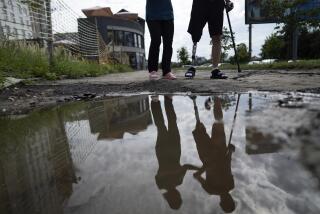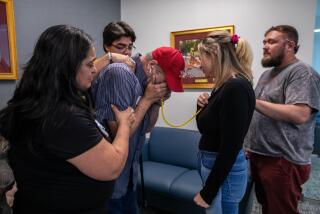Nonvital Organ Transplants Debated
- Share via
LOUISVILLE, Ky. — Not long ago, Matthew Scott did something he had wanted to do for years. He started wearing his wedding ring on his left hand.
It is an indication of how comfortable Scott feels with the extremity that doctors took from a cadaver and attached to his forearm in a 14 1/2-hour operation at Jewish Hospital a year ago.
When surgeons in Louisville began talking about performing the nation’s first hand transplant, many in their field had serious reservations. The likelihood of success was too small, critics said, and the ethical concerns too great.
Despite promising results so far, the debate over the future of transplants of such nonvital organs has yet to be settled.
Medical ethicists have been most concerned that transplant patients must take anti-rejection drugs for the rest of their lives to keep the body from trying to destroy the foreign tissue. The drugs suppress the immune system, leading to an increased risk for infections, cancer and even death.
But according to Linda Emanuel, director of the American Medical Assn.’s Institute on Ethics, the basic question has not changed: Do the potential gains of the procedure justify the risks?
The answer is clear for a heart or liver transplant because the patient will die without the organ. Nonvital parts such as a hand require further contemplation.
Scott, 38, lost his hand in a firecracker accident in 1985 and did not adjust well to a prosthesis. He knows the transplanted hand he received in January 1999 will never be as good as his real one, but he has no regrets about the surgery.
“I’m a different person now than I was a year ago,” he said. “A lot of those daily frustrations--the kind that would send a pen flying across the room--are gone now.”
Scott’s doctors say his progress has met all of their expectations. They recently showed a video of him using the new left hand to write his name, pour a glass of water, deal cards and tie his shoes.
It is those things that most people never think about that matter most to Scott, who works as an administrator for an emergency medical center in New Jersey.
At first, many doctors doubted he would ever develop useful function or sensation in the new extremity. But he has some feeling in his fingertips, can feel changes in temperature and can move his thumb as he begins to gain function in the hand’s small muscles.
The progress is part of the reason why in January, on his last visit to Louisville for a checkup, Scott and his wife, Dawn, went to a jeweler and got his wedding band resized.
At the very least, Scott’s case shows that such an operation has some benefits for the patient.
“I think people are more optimistic about it now. Someone has lived to talk about it a year later,” Emanuel said.
Given what is known, Emanuel believes the surgeons in Louisville are justified in continuing their work on hand transplants. But the situation still bears watching.
“I have some reservations,” Emanuel said. “Those reservations are somewhat diminished, but they’re not completely gone.”
Scott’s doctors, meanwhile, say they are ready to perform another transplant as soon as a suitable match can be found between patient and donor. It’s a plan the American Society for Surgery of the Hand opposes, even as it advises caution.
The group’s president, Dr. William P. Cooney, said no further hand transplants should be performed until doctors from around the country can examine Scott and confirm his progress. The group would also like to see more animal research.
Scott’s doctors cannot guarantee that he will not lose the hand, nor can they be sure that future patients would keep transplanted hands. Cooney said it would be a shame to perform the operation on several more patients, only to learn eventually that the transplants had a high rate of failure.
Dr. Matthew Tomaino, chief of microsurgery for the University of Pittsburgh’s orthopedic surgery department, said he is closely observing Scott’s case. Initially skeptical that a transplanted hand would ever have much sensation, Tomaino said he’s been impressed by Scott’s improvement. If Scott continues to improve after a couple of years, he said, he could foresee the University of Pittsburgh attempting the procedure.
“I think the future of nonvital transplantation is very bright. It makes complete sense,” he said.
Tomaino was particularly encouraged when he learned that Scott’s regimen of anti-rejection drugs is similar to what kidney transplant recipients take. That means his immune system is not suppressed as much as those of patients who receive other organs, such as a heart.
Five people in the world are living with transplanted hands. Two of them underwent surgery in France, with the first receiving a hand in September 1998. Two have had hands attached in recent months in China.
Dr. Jon Jones, the lead transplant surgeon for Scott, said he anticipates that hand transplants will continue to be performed at low volume for several years until there are major advances in preventing rejection--possibly treatments that do not affect the immune system.
Then the benefits of the surgery would be proportionately higher and more people might opt for it, he said, as long as doctors can show that transplanted hands can consistently develop good function and improve quality of life.
More to Read
Sign up for Essential California
The most important California stories and recommendations in your inbox every morning.
You may occasionally receive promotional content from the Los Angeles Times.













